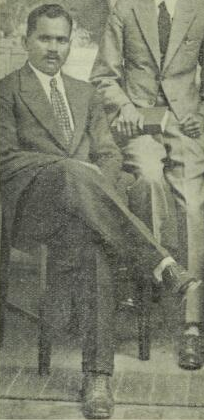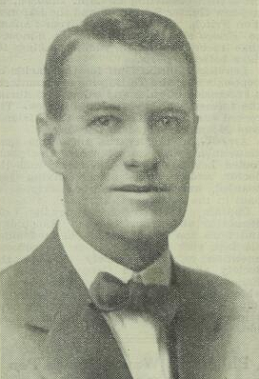 |
|---|
| Constitution |
General elections were held in Western Samoa on 9 November 1932. [1]
 |
|---|
| Constitution |
General elections were held in Western Samoa on 9 November 1932. [1]
In 1930 the constitution was amended to reduce the number of Europeans in the Legislative Council from three to two and to have two Samoans nominated. [2]
The two elected European members were elected from a single two-seat constituency, with only Europeans allowed to vote. [1] Voters were able to vote for two candidates.
Five candidates contested the two available seats. Brothers-in-law Irving Carruthers and Alan Cobcroft were both supported by the Chamber of Commerce and the Planters' Association, as well as many civil servants. The other three candidates all ran as independents, including sitting member Samuel Meredith. [1] Alexander W. Johnston, the other incumbent member, had died in June 1932 and his seat left vacant until the elections. [3]
| Candidate | Votes | % | Notes |
|---|---|---|---|
| Irving Carruthers | 76 | 25.08 | Elected |
| Alan Cobcroft | 72 | 23.76 | Elected |
| Robert Graham Bruce | 69 | 22.77 | |
| Robert Carl Wekell | 47 | 15.51 | |
| Samuel Meredith | 39 | 12.87 | Unseated |
| Total | 303 | 100.00 | |
| Total votes | 157 | – | |
| Registered voters/turnout | 172 | 91.28 | |
| Source: Pacific Islands Monthly [1] | |||
The newly elected Council met for the first time on 23 March 1933. [4]

General elections were held in Fiji between 26 September and 8 October 1966, the last before independence in 1970 and the first held under universal suffrage. The result was a victory for the Alliance Party, which won 23 of the 34 elected seats. Its leader Kamisese Mara became the country's first Chief Minister the following year.
Kunwar Bachint Singh was an Indo-Fijian teacher and politician. He arrived in Fiji in 1927 as a teacher for the Arya Samaj but his association with Vishnu Deo led him to play an active role in aggressively promoting the Arya Samaj and finally into politics. He was elected into the Legislative Council as a protégé of Vishnu Deo but after the election took an independent stance opposed to the wishes of the majority of the Indo-Fijians. He supported nominated rather than elected representation, actively supported the war effort and even attempted to set up a farmers union opposed to a number of existing unions. The Government rewarded him for his loyalty by nominating him into the Legislative Council three times, appointing him as a Justice of the Peace and as the first Indo-Fijian member of the Executive Council.

Muniswamy Mudaliar was an Indo-Fijian politician who was a member of the Legislative Council from 1932 to 1937. In 1933 he became Fiji's first Indo-Fijian Justice of the Peace.

General elections were held in Western Samoa on 22 February 1985. Voting was restricted to matai and citizens of European origin, with the matai electing 45 MPs and Europeans two. The result was a victory for the Human Rights Protection Party, which won 31 seats. Its leader, Tofilau Eti Alesana, remained Prime Minister.

General elections were held in Western Samoa on 4 April 1964, the first since independence in 1962. All candidates ran as independents. Following the elections, Fiamē Mataʻafa Faumuina Mulinuʻu II remained prime minister.

General elections were held in Western Samoa on 25 February 1967. All candidates ran as independents and voting was restricted to Matai and citizens of European origin, with the Matai electing 45 MPs and Europeans two. Following the election, Fiame Mata'afa Faumuina Mulinu'u II remained Prime Minister.

General elections were held in Western Samoa on 24 February 1973. All candidates ran as independents and voting was restricted to matai and citizens of European origin, with the matai electing 45 MPs and Europeans two. Following the election, Fiame Mata'afa became Prime Minister for a second term, having previously held the office between 1959 and 1970.

General elections were held in Western Samoa on 21 February 1976. All candidates ran as independents and voting was restricted to Matai and citizens of European origin, with the Matai electing 45 MPs and Europeans two. Following the election, Tupuola Efi became prime minister.

General elections were held in Western Samoa on 24 February 1979. Voting was restricted to matai and citizens of European origin, with the Matai electing 45 MPs and Europeans two. Although all candidates ran as independents, an opposition bloc had emerged following the 1976 election of Tupuola Efi as Prime Minister in Parliament.

General elections were held in Western Samoa on 27 February 1982. The Human Rights Protection Party won 22 of the 47 seats in the Legislative Assembly and was able to form a government after three independents voted for its leader, Va'ai Kolone, in the vote for prime minister.

General elections were held in Fiji on 31 August 1932, although only one of the nine elected seats was contested.

General elections were held in Fiji in July 1937, the first in which an equal number of Europeans and Indo-Fijians were elected.

General elections were held in Fiji in August 1956; voting took place in the Eastern constituencies between 11 and 18 August, and on 18 August in all other constituencies.

General elections were held in Western Samoa on 1 November 1935.

Alfred George Smyth was a New South Wales-born Western Samoan politician.

General elections were held in Western Samoa on 5 November 1941.

General elections were held in Western Samoa on 15 November 1957.

General elections were held in Papua and New Guinea on 27 August 1960.

Constitutional Assembly elections were held in Western Samoa on 23 July 1960.

General elections were held in Western Samoa on 4 February 1961. They had originally been planned for November 1960, but were postponed by three months.